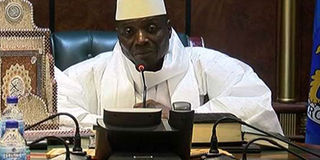Most humiliating exit for a dictator

Yahya Jammeh who had refused to hand over power to Adama Barrow. PHOTO | AFP
What you need to know:
- Adama Barrow was finally sworn in as the third president of The Gambia on Thursday evening.
- A former chairman of the African Union, Jammeh seized power in a 1994 coup and clung to office for 22 years.
- Ecowas had few options but to scuttle Jammeh’s attempts to hang onto power and his refusal to leave on January 19 when his term expired.
Were he not notorious for serial buffoonery, beleaguered Gambian despot Yahya Jammeh could have earned sympathy from some quarters.
Unfortunately, and as a mark of Jammeh’s consummate idiocy, his high noon moment came amid riveting tragi-comedy that saw him exposed as the irredeemable clown he had become.
As matters turned out, after being besieged for days by erstwhile Ecowas colleagues, his goose was evidently cooked when Adama Barrow was finally sworn in as the third president of The Gambia on Thursday evening.
The latter, a simple real estate businessman with a humble background, was the man who beat Jammeh in the December 1 election.
Sadly for the tyrant, prior to the inexorable fate that seemed to await him, he was pathetically isolated by closest allies during the last days in power, even as the noose tightened around his neck.
Poignantly and reminiscent of the aphorism about rats leaving a sinking ship, during his hour of need, Jammeh was abandoned by those he was counting on as he sought to desperately and cunningly hold onto power.
A former chairman of the African Union, Jammeh seized power in a 1994 coup and clung to office for 22 years.
He was a veteran member of the same Ecowas that was very keen to see the last of him.
CHANGING GLOBAL POLITICS
Given the rapidly changing global geopolitics, especially the latest developments in Europe and the United States, with their new introspective policies, it was becoming clear that they would have limited time to focus on African problems.
With the swearing in of Donald Trump as the 45th president of the US — coincidentally, the same day Jammeh was in his last hours as head of state — it was becoming clear that world powers were likely to reduce their involvement in Africa.
That sort of message made it more urgent for organisations like the AU and Ecowas to find ways of resolving matters, both political and economic, that would in the past have appeared intractable.
Ecowas therefore had few options but to scuttle Jammeh’s attempts to hang onto power and his refusal to leave on January 19 when his term expired.
Ecowas’ efforts were made more difficult by Jammeh’s declaration of a state of emergency in the Gambia, and his insistence on refusing to stop Barrow from assuming his mandate.
Unfortunately for Jammeh, he was pitted against the AU and Ecowas.
He had also been disowned by those he was depending on most, including his lawyer Edward Anthony Gomez.
Also quick to disassociate himself with the evidently doomed former boss was Ousman Badjie, the army commander, who made it clear that his men would not attempt to fight if and when Ecowas troops entered The Gambia.
For greater clarity, the Gambia’s army chief said foreign troops would be welcomed “with a cup of tea” rather than gunfire if they intervened in the country’s crisis.
WARNING SHOTS
Eventually, though, there was no need to forcefully remove Jammeh from the seat of power. In fact, as matters turned out, a few warning shots were reportedly all that was necessary to convince Jammeh to relinquish the county’s presidency.
That he should have to do so in ignominy was a statement of the man’s legendary overconfidence and pathetic lack of good judgement, exemplified by a statement he once made about not needing anybody’s advice.
“No matter what people say about me, I am not moved...I don’t listen to anybody because I know what is important,” he said before the December 1 election in a display of his usual arrogance.
“Governing,” he added, “is between me and God Almighty.”
Given that king of attitude, it is not surprising that Jammeh all along failed to see the writing on the wall, which would have presumably salvaged what little was left of his reputation.
As matters turned out, the formerly supremely confident despot is going out in humiliating circumstances, and with his tail decidedly between his legs.
Whereas it is still not clear where he will finally end up, it is sad that Yahya Jammeh is not welcome in his own country.





